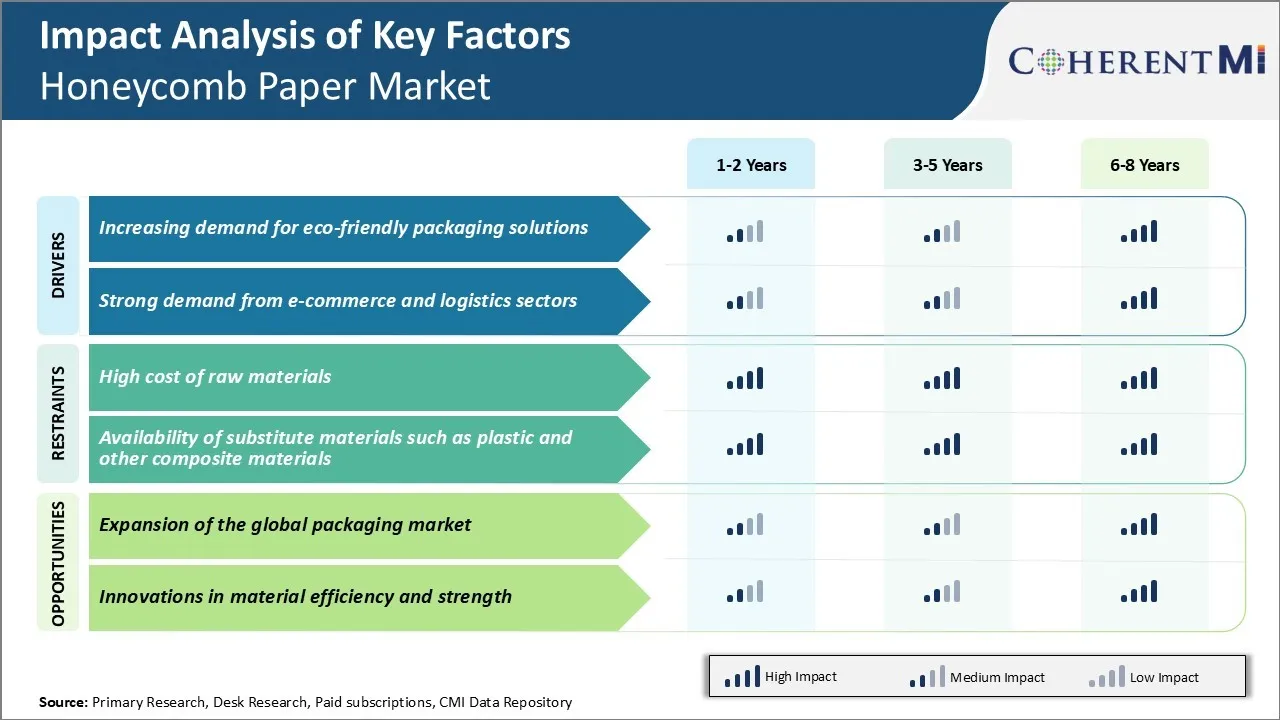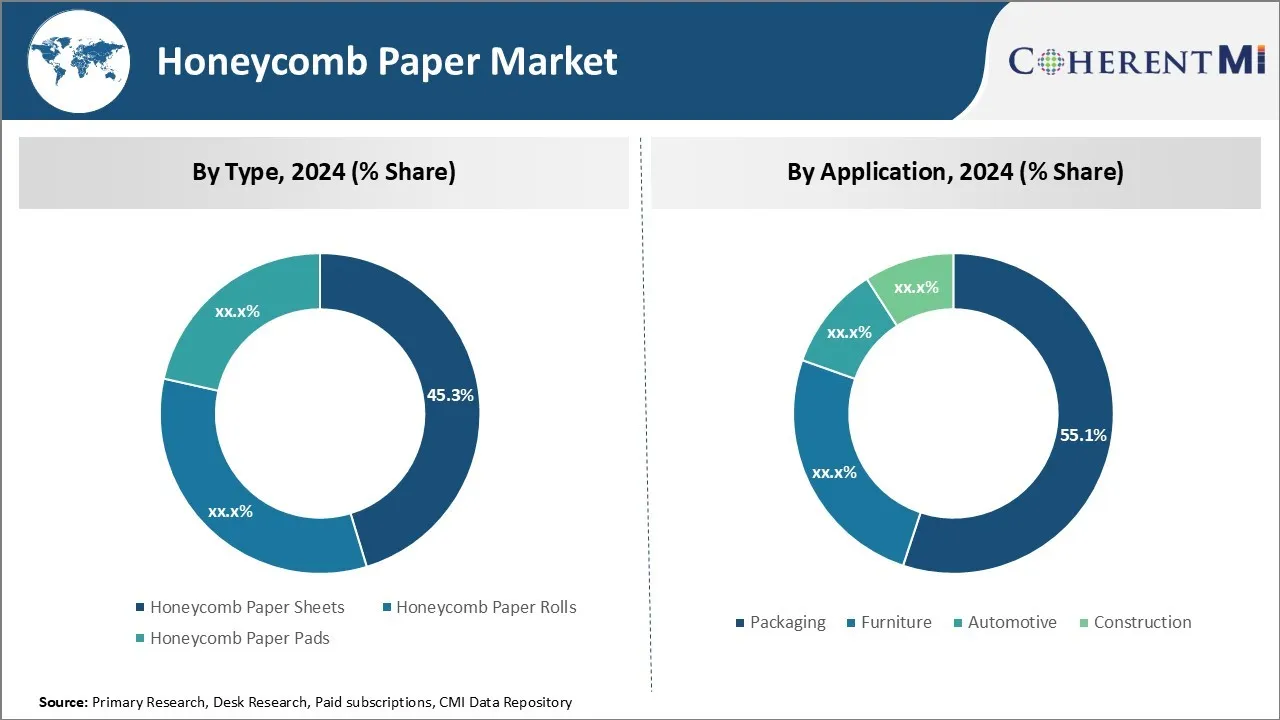Honeycomb Paper Market SIZE AND SHARE ANALYSIS - GROWTH TRENDS AND FORECASTS (2024 - 2031)
Honeycomb Paper Market is segmented By Type (Honeycomb Paper Sheets, Honeycomb Paper Rolls, Honeycomb Paper Pads), By Application (Packaging, Furnitur....
Honeycomb Paper Market Size
Market Size in USD Bn
CAGR6.1%
| Study Period | 2024 - 2031 |
| Base Year of Estimation | 2023 |
| CAGR | 6.1% |
| Market Concentration | Medium |
| Major Players | Papeteries de Genval, Geocell GmbH, Schut Papier, Norbord Inc., Smurfit Kappa Group and Among Others. |
please let us know !
Honeycomb Paper Market Analysis
The honeycomb paper market is estimated to be valued at USD 6.27 Bn in 2024 and is expected to reach USD 9.5 Bn by 2031, growing at a compound annual growth rate (CAGR) of 6.1% from 2024 to 2031. The honeycomb paper market is driven by the increasing demand from various end use industries like packaging, furniture, and construction.
Honeycomb Paper Market Trends
Market Driver - Increasing Demand for Eco-Friendly Packaging Solutions
The adoption of sustainability practices across industries has been on a rise over the past few years. Companies are focusing on cutting down plastic waste and opting for packaging materials that cause minimal harm to the environment. Honeycomb paper emerges as one such eco-friendly solution that is gaining popularity.
Customers are demanding sustainable alternatives and are willing to pay a bit extra for packaging that does not harm nature. They want companies to take responsibility for the environmental impact of their operations. This changing mindset is a key driver for brands to switch to paper-based cushioning like honeycomb paper. Some businesses are openly communicating their sustainability commitments to end-customers and highlighting eco-materials used in packaging. This boosts customer confidence and loyalty towards such brands in the honeycomb paper market.
Overall, with sustainability gaining paramount importance, we expect the demand for honeycomb paper to keep rising. Companies and vendors will continue to actively look for green substitutes to traditional plastics and foams for cushioning and protection purposes.
Market Driver - Strong Demand from E-commerce and Logistics Sectors
Honeycomb paper perfectly fits this requirement of the logistics industry as it provides outstanding cushioning to ship multiple fragile items of varying shapes and sizes together. Its innate resilience amid impacts and vibrations experienced in transit has made it popular among freight companies.
E-commerce platforms also prefer honeycomb paper for its filler properties to fill void spaces within boxes and bundles during deliveries. Additionally, it reduces packing time at fulfillment centers since one sheet of honeycomb acts as both filler and cushioning material.
Meanwhile, online shoppers actively demanding shorter delivery windows have upped the pressure on logistics networks. Honeycomb paper packaging plays a key role in maintaining delivery schedules by ensuring damage-free transportation of goods even under tight deadlines. This makes e-tailers rely more on honeycomb papers to retain customers.
Overall, expansion of the e-commerce industry and focus on fast fulfillment continue propelling the need for sustainable yet high-performance packaging materials like honeycomb paper. Thereby, the honeycomb paper market will keep witnessing sustained gains through strengths of the logistics and online shopping domain.

Market Challenge - High Cost of Raw Materials
One of the key challenges currently faced by the honeycomb paper market is the high and volatile cost of raw materials. As honeycomb paper uses large quantities of raw kraft paper, any fluctuations in prices of wood pulp and paper can have a significant impact on production costs for manufacturers.
Over the past year, wood pulp prices have risen sharply across global markets due to declining forest inventories, increasing demand from China and other developing economies, and transportation bottlenecks. This has resulted in raw material costs escalating for honeycomb paper producers. With margins being already razor-thin in the honeycomb paper market, manufacturers now struggle to maintain profitability levels.
The high raw material prices and unstable input price environment have discouraged many smaller players from investing in capacity expansions. For the industry to sustain healthy growth rates, long-term stability in raw material prices is essential for players to undertake capital expenditures.
Market Opportunity - Expansion of the Global Packaging Market
One of the major opportunities for the honeycomb paper market is the projected expansion of the global packaging industry in the coming years. Honeycomb paper finds widespread use in the packaging of various industrial and consumer goods due to characteristics like high strength-to-weight ratio, vibration dampening properties, and ability to protect products from damage.
The global packaging market has been growing steadily supported by increasing domestic consumption as well as growth in e-commerce. Rising packaging requirements from industries such as food and beverages, consumer electronics, pharmaceuticals and automotive are driving packaging consumption globally.
Moreover, with more companies outsourcing manufacturing operations to emerging economies, cross-border trade volumes are surging which translates to higher need for industrial packaging. The continued expansion of the end-use packaging segment therefore ensures growth prospects for demand of protective paper packing materials like honeycomb paper. Players could leverage the packaging sector growth to fuel sales volumes and scale-up production.
Key winning strategies adopted by key players of Honeycomb Paper Market
Strategic Expansion into New Regions: Many top players have expanded their production facilities and distribution networks into emerging markets in Asia Pacific, Latin America, and Middle East regions over the past 5 years.
Diversification of Product Portfolio: Leading suppliers like Coco Products and SCG Paper have successfully diversified their product portfolio to include different grades of honeycomb papers catering to various industries.
Strategic Acquisitions: Key acquisitions have also enabled companies to broaden their geographic reach and product range. In 2020, Huhtamaki, one of the largest FCB suppliers, acquired 80% stake in Turkish company Fresh-n-Safe, a leader in protective packaging in Europe.
Focus on Innovation: Leading companies consistently invest 5-7% of their annual revenues in R&D to drive product innovation.
Segmental Analysis of Honeycomb Paper Market

Insights, By Type: Versatility and Strength Drive Honeycomb Paper Sheets Demand
Honeycomb paper sheets contribute 45.3% share of the honeycomb paper market by type due to their versatility and strength. Sheets allow for easy customization of size and shape to fit various packing needs. Their honeycomb structure provides crush-resistance and protects fragile items during shipping. This makes sheets popular for packaging electronics, glassware, and other breakable goods.
The sheet form factor allows for easy cutting and folding into custom shapes. Manufacturers can die cut sheets into specific sizes and designs like round or hexagonal shapes. Sheets are also lightweight and space-efficient. Their hollow core structure takes up less volume per unit of paper used versus solid sheets. The honeycomb pillars collapse slightly under pressure, enabling sheets to safely consolidate irregular empty spaces within packages. Their resilient yet compressible nature realizes further shipping efficiencies.
Insights, By Application: Furniture Upholstery Drives Robust Demand for Honeycomb Paper Rolls
Within the honeycomb paper market by application, furniture accounts for 55.1% share led by robust demand from upholstery applications. Honeycomb paper rolls excel as an upholstery material due to their cushioning and support. The honeycomb structure provides plush yet firm padding for sofas, chairs, and mattresses. It conforms comfortably to the body without bottoming out.
Rolls allow for continuous feeding into upholstery machinery versus pre-cut sheets. This boosts production efficiency and reduces material waste for upholsterers. Their long, tubular format also neatly contains and distributes padding inside furniture frames. Rolls can flexibly fill irregular spaces versus rigid sheets or pads.
In summary, honeycomb paper rolls meet demanding needs of the furniture industry. Their form-fitting drapability, production efficiencies and long-lasting support drive robust demand outpacing other applications.
Insights, By End User: Growth of Industrial Automation Drives Demand from Industrial End Users
Within the honeycomb paper market by end user, industrial applications account for the highest share. This growth stems from expanding use of honeycomb materials across various production and manufacturing sectors.
Industrial end users rely on honeycomb for protective enclosures, cushioning, insulation and more. Its energy-absorbing properties make honeycomb an important industrial packaging material. Whether used in protective cases, wrappings or void fill, honeycomb paper safely transports and stores machine components, tools and other industrial goods.
Furthermore, honeycomb finds widening use as a core material in composite sandwiches. These lightweight yet high-strength structures get incorporated into industrial equipment like machine guards, work platforms, and building panels. Honeycomb’s strength-to-weight profile enables performance improvements across these applications.
In light of expanding industrial automation, honeycomb paper caters perfectly to demanding performance and versatility needs across manufacturing sectors. This positions industrial applications as the key growth driver for the honeycomb paper market over the coming years.
Additional Insights of Honeycomb Paper Market
- Growth in E-commerce: The rise in e-commerce continues to drive the demand for honeycomb paper packaging as it provides cost-effective, eco-friendly, and durable packaging solutions.
- Sustainability Trends: Increasing focus on sustainable packaging is influencing manufacturers to shift from traditional plastic to paper-based alternatives, especially honeycomb paper.
- Technological Advancements: Technological advancements in manufacturing techniques are making honeycomb paper more versatile, affordable, and efficient for different industries.
- The honeycomb paper market is projected to grow significantly across North America and Europe, with strong demand expected from industries such as automotive, construction, and packaging.
- The growing emphasis on sustainable packaging solutions has led to widespread adoption of honeycomb paper across various end-use industries.
Competitive overview of Honeycomb Paper Market
The major players operating in the honeycomb paper market include Papeteries de Genval, Geocell GmbH, Schut Papier, Norbord Inc., and Smurfit Kappa Group.
Honeycomb Paper Market Leaders
- Papeteries de Genval
- Geocell GmbH
- Schut Papier
- Norbord Inc.
- Smurfit Kappa Group
Honeycomb Paper Market - Competitive Rivalry, 2024

Honeycomb Paper Market
(Dominated by major players)
(Highly competitive with lots of players.)
Recent Developments in Honeycomb Paper Market
- In January 2024, Smurfit Kappa Group: Smurfit Kappa expanded its honeycomb paper solutions for e-commerce packaging, aiming to improve product protection during transit. This innovation is expected to reduce material costs and increase packaging efficiency.
- In October 2023, Geocell GmbH, Geocell introduced a new line of sustainable honeycomb paper products designed to replace traditional plastic packaging. This initiative is set to reduce carbon footprints and enhance the brand’s sustainability image.
- In July 2023, Schut Papier, Schut Papier launched a new lightweight honeycomb paper for the furniture industry, designed to offer superior strength and better recyclability. This innovation has positioned the company as a leader in the sustainable packaging sector.
Honeycomb Paper Market Segmentation
- By Type
- Honeycomb Paper Sheets
- Honeycomb Paper Rolls
- Honeycomb Paper Pads
- By Application
- Packaging
- Furniture
- Automotive
- Construction
- By End User
- Industrial Applications
- Commercial Uses

Would you like to explore the option of buying individual sections of this report?
Frequently Asked Questions :
How big is the honeycomb paper market?
The honeycomb paper market is estimated to be valued at USD 6.27 Bn in 2024 and is expected to reach USD 9.5 Bn by 2031.
What are the key factors hampering the growth of the honeycomb paper market?
High cost of raw materials and low availability of substitute materials such as plastic and other composite materials are the major factors hampering the growth of the honeycomb paper market.
What are the major factors driving the honeycomb paper market growth?
Increasing demand for eco-friendly packaging solutions and strong demand from e-commerce and logistics sectors are the major factors driving the honeycomb paper market.
Which is the leading type in the honeycomb paper market?
The leading type segment is honeycomb paper sheets.
Which are the major players operating in the honeycomb paper market?
Papeteries de Genval, Geocell GmbH, Schut Papier, Norbord Inc., and Smurfit Kappa Group are the major players.
What will be the CAGR of the honeycomb paper market?
The CAGR of the honeycomb paper market is projected to be 6.1% from 2024-2031.